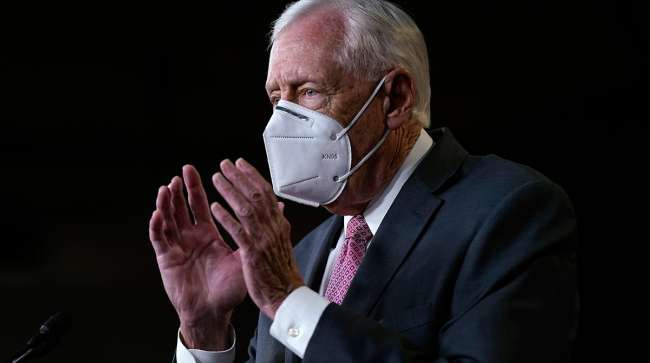Senior Reporter
Senators Debate Pandemic Aid Bill Amid Infrastructure Funding Proposals

[Ensure you have all the info you need in these unprecedented times. Subscribe now.]
Senate Democrats aim to advance a $1.9 trillion COVID-19 relief measure that includes aid for transportation corridors before expanded unemployment benefits expire March 14.
Democrats, who manage the Senate’s operations, signaled their intention to pass the aid package before the deadline by relying on a budgetary process that essentially circumvents the chamber’s filibuster.
The Senate leadership said their legislation would resemble a House-passed version. Overall, Democrats in the House are proposing about $30 billion for transit operations and safety protections for workers, $3 billion for the aerospace manufacturing industry, and more than $1 billion for Amtrak. Additionally, they would provide aspects of the airline industry about $15 billion.
What the American people need are fast-acting plans to open schools now, get laid-off Americans into jobs, and finish the fight against COVID-19.
The Democrats’ plan doesn’t focus on that. It manages to spend ~$2T while leaving the most urgent things on the cutting room floor. pic.twitter.com/6UyBLBZPsH — Leader McConnell (@LeaderMcConnell) March 3, 2021
House Democrats indicated they would take up the Senate’s revised bill to clear it for President Joe Biden’s signature before mid-March.
“We are determined to send the [COVID-19 relief package] to President Biden’s desk before March 14 so that we can begin providing American workers, businesses, schools, communities, men, women, children, with the assistance they so crucially need,” said House Majority Leader Steny Hoyer (D-Md.).
Notwithstanding the Democrats’ enthusiasm for approving a new round of pandemic aid, Senate Minority Leader Mitch McConnell (R-Ky.) emphasized that his caucus would oppose a legislative proposal crafted without bipartisan input.
“What the American people need are fast-acting plans to get schools reopen now, get laid-off workers back into jobs, and finish the fight against this virus. The Democrats have instead drawn up a liberal omnibus [legislation] to fund miscellaneous government spending for the next decade,” said McConnell.
“The Democrats had a choice. They chose to go it alone, tack to the left, and leave families’ top priorities on the cutting-room floor,” the top Republican added.
Meanwhile, shortly after this new round of aid becomes law, White House officials say they plan to pursue Biden’s multitrillion-dollar “build back better” economic agenda. An aspect of the president’s agenda focuses on infrastructure policy, specifically renewable energy, environmental justice and climate change-centric programs.
While the White House has yet to outline ways to fund the so-called “build back better” plan, Democratic leaders on Capitol Hill recently touted potential sources of funding.
For instance, House Appropriations Chairwoman Rosa DeLauro (D-Conn.) last month announced Democrats would consider requests specific to “community funding projects,” or proposing lifting Congress’ ban on earmarking. The chairwoman argued doing so would be a “critical reform that will make Congress more responsive to the people.”
“Our bipartisan reforms will produce a small number of projects with strong community support, a transparent process where no member’s family can benefit and where projects are audited to ensure money was spent as planned,” she explained.
Transportation and Infrastructure Chairman Peter DeFazio (D-Ore.) said he intends to revive earmarks during the consideration of a multiyear highway policy bill. The legislation would update the country’s premier highway law that expires in September.
DeFazio has advocated for allowing members of Congress to direct funds for a specific project or purpose, the legislative practice known as earmarking. (Earmarks were banned a decade ago due to controversy.)
“The discretion to fund projects should not be reserved for state or federal bureaucrats. Elected representatives know the infrastructure needs of their district and should be allowed to identify projects and advocate on behalf of their constituents in legislation,” DeFazio said March 3. “With a transparent, efficient process in place to identify district priorities, coupled with good partnership from the federal government, Congress can help put people to work on badly needed infrastructure projects and transform the way we build and move.”
A two-cent #WealthTax on fortunes above $50 million would help level the playing field a little bit to #BuildBackBetter and make investments in America’s future. pic.twitter.com/57ARBS7l5f — Elizabeth Warren (@SenWarren) March 1, 2021
Another funding proposal would be a tax. Sen. Elizabeth Warren (D-Mass.), a member of the Banking Committee with jurisdiction over transit operations, proposes taxing households worth higher than $50 million. The senator argued the tax would generate revenue for infrastructure projects.
Under Warren’s proposal, a 2% annual tax would be imposed on households and trusts worth between $50 million and $1 billion, and a slightly higher tax would be imposed on households and trusts worth above $1 billion.
“As Congress develops additional plans to help our economy, the wealth tax should be at the top of the list to help pay for these plans because of the huge amounts of revenue it would generate. This is money that should be invested in child care and early education, K-12, infrastructure, all of which are priorities of President Biden and Democrats in Congress,” Warren said. “I’m confident lawmakers will catch up to the overwhelming majority of Americans who are demanding more fairness, more change, and who believe it’s time for a wealth tax.”
Want more news? Listen to today's daily briefing below or go here for more info:




